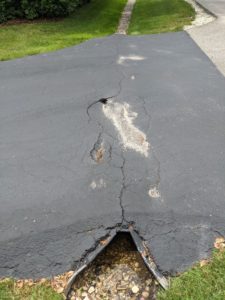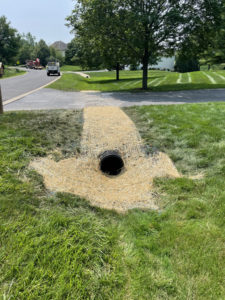Replacing Your Driveway?
A permit is not required for a driveway replacement. However, there are times when a road bond will be required to cover damage to our roadways during construction.
Prior to replacing your driveway, please contact our highway department to check for any road or right of way considerations, such as driveway culvert replacements, upcoming storm sewer work or paving, or curb repair.
Driveway Culverts
****As of April 26, 2022 our highway department is temporarily discontinuing our culvert replacement program due to this season's work load and short staffing. If you choose to replace your driveway, please call us for a culvert inspection. We will provide a replacement pipe if one is needed. We will continue to replace collapsing or failing driveway culverts.
If you live on a road with ditches, odds are you have a culvert under your driveway to convey water. In years past, steel culverts were common and likely what the builder installed. However, exposure to salt during the winter causes the steel to corrode and deteriorate in the short span of 20 years.
Prior to re-paving your driveway, it is wise to have our highway department staff evaluate the condition of your culvert. Failing to do so could result in your new driveway being cut into to replace a collapsed culvert. We recommend installing a new plastic pipe (made of HDPE N-12 or SDR26 if there is minimal cover between top of pipe and asphalt) that will last indefinitely.
Our highway department currently replaces driveway culverts upon request, as workload allows, for the following reasons:
- resident is re-paving driveway and currently has a steel culvert with less than 10 years estimated life
- culvert is showing signs of collapsing, as evidenced by sinkholes or depressions in pavement
Prior to re-paving roads or improving ditch grading, our department may elect to change culverts in a localized area for efficiency’s sake.
We require at least 6 weeks notice prior to paving date. This time allows us to schedule it in our workload, get a JULIE locate, install the pipe and allow for 2-3 weeks for gravel to settle prior to paving.
If we are notified with less than 6 weeks notice and cannot complete the install due to roadway projects, we will provide and deliver the pipe (at no cost) for your contractor to install.
We do not install flared end (the metal sections on either end of the culvert) unless required for water flow. We will not change the diameter of the culvert unless advised by our engineer after careful consideration of upstream or downstream effects.
Please notify the department if you have a dog fence or irrigation system in the right of way or worksite. Our department will not be held responsible for damages to these systems, although our crew will work diligently to avoid damages.
The landscaping, brick, or stone work around culvert are the responsibility of the homeowner. The highway department will re-seed grass and cover any disturbed areas with straw blanket.
What to expect
A week prior:
Ditchline and culvert will be located for utilities
A day prior:
Department will give resident notification of start time
Day of:
Resident should park in roadway if they need use of their vehicle. Driveway will be unusable for approximately 4-5 hours. At conclusion of work, culvert will be backfilled with gravel, allowing passage to and from driveway.
Often, ditch work is required after the culvert is changed to adequately convey water upstream and downstream of culvert.
After pipe install:
Our highway department staff will re-seed grass areas and cover with straw blanket.
If gravel settles, please contact the highway department for additional gravel.
If you are not re-paving your driveway, our highway department will patch your driveway with asphalt. We usually try to coordinate multiple asphalt projects together, so please have patience if it takes several weeks for the patching. Homeowner are responsible for concrete driveways and re-laying brick pavers.
FAQs
FAQs
Can you change the size of my culvert?
Not without an engineering study, which is rarely justified for a driveway culvert.
Can you increase the length of my culvert?
Yes, the pipe is cut to size for each job, so it’s usually no problem adding a couple extra feet on either side.
Can you pipe my whole ditch?
Unfortunately, the answer is almost always No. Adding storm sewer adds additional expense and maintenance that isn’t sustainable with the taxing structure in unincorporated areas. Reduced property taxes also mean no sidewalks, street lights in most areas, and ditches instead of storm sewer.


